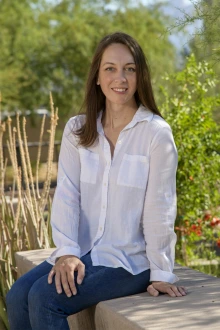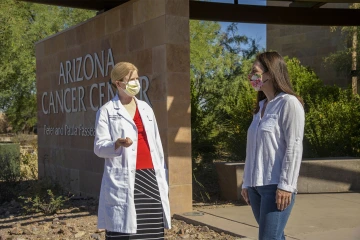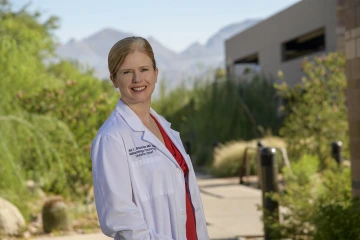Immunotherapy Cancer Vaccine Trial Offers Patients New Hope
Researchers used a patient’s cancer cells to teach her immune system how to recognize and destroy the cancer, revealing an option for successfully treating others.
Molly Cassidy was an active and healthy mother in her 30s when a relentless form of head and neck cancer presented her with a grim prognosis.
“The doctors felt that my treatment options were quite limited because of how quickly the cancer came back after initial treatments,” Cassidy said. “I was feeling very sick; I had to start thinking about end-of-life decisions.”

When initial treatments failed, Molly Cassidy enrolled in a clinical trial through the UArizona Cancer Center, where she received personalized cancer vaccines. Today, all signs of her cancer are gone.
Fortunately for Cassidy, modern approaches to personalized medicine are offering new hope in fighting even the most aggressive of cancers. Personalized cancer vaccines, a key component of the University of Arizona Health Sciences’ efforts to design and develop precision treatments, are one of those emerging treatment options. They use the patient’s own cancer cells to develop a vaccine intended to teach their immune system how to recognize and destroy the cancer.
Cassidy’s team of doctors, which included Julie Bauman, MD, MPH, deputy director of the University of Arizona Cancer Center, provided her information about a clinical trial studying personalized cancer vaccines in combination with with an immunotherapy drug that helps the immune system fight certain kinds of cancer. Knowing she was running out of both time and options after the initial treatment was unsuccessful, Cassidy enrolled in the trial.
“Molly, like each patient in the trial, received her own personalized vaccine,” said Dr. Bauman, professor in the College of Medicine – Tucson Department of Medicine and chief of the Division of Hematology and Oncology at the college and Banner – University Medical Center Tucson. “The vaccine is a way for us to try to get the right immune cells in the right place at the right time to attack the cancer.”
For Cassidy, the treatment was lifesaving. Within a year of beginning the trial, she was in a complete response, which means there are no signs of cancer.
Cassidy’s Cancer Diagnosis
A graduate of the UArizona James E. Rogers College of Law, Cassidy was studying for the Arizona bar exam in early 2019 when she felt an earache. The stabbing pain intensified over a couple weeks, eventually spreading down through her jaw.
When she discovered a bump under her tongue, she was alarmed enough to visit a local urgent care, where her symptoms were chalked up to the stress of having a 10-month old son and the upcoming bar exam.
Two days later Cassidy visited her dentist, who also attributed the pain to stress but referred her to an oral surgeon for the lump.

Cassidy was under the care of Julie Bauman, MD, MPH, who treated her for an aggressive form of head and neck cancer.
“He looked at me for about five seconds and said, ‘You have cancer’,” Cassidy said of Travis Sorensen, DMD, and his quick diagnosis. “It was a real big shock.”
Dr. Sorensen directed Cassidy to immediately see an ear, neck and throat (ENT) specialist. She went to the emergency room, where the on-call ENT referred her to Steven Wang, MD, professor and chair of the Department of Otolaryngology – Head and Neck Surgery at the UArizona College of Medicine – Tucson.
Less than a week after her visit to urgent care, Cassidy was diagnosed with aggressive head and neck cancer.
“They warned me that I would need really aggressive treatments,” Cassidy said. “They were going to hit me with everything that they could to try to cure me.”
In mid-March, she had surgery to remove the tumors, followed by 34 sessions of radiation simultaneous with three cycles of chemotherapy. Ten days after her final cycle of chemoradiation, Cassidy noticed a lump on her collarbone. The cancer was back and had spread to include tumors behind her spine and around her lungs.
Within weeks, Cassidy began the personalized cancer vaccine treatment in combination with the prescribed immunotherapy drug.
How the Vaccine Works
Cancer cells have DNA mutations that differ from the DNA in normal, healthy cells. These mutations are different from patient to patient, which is where the concept of a personalized cancer vaccine is developed.
To identify the patient-specific mutations of the cancer, mutated DNA from the patient’s tumor is simultaneously sequenced with healthy DNA from the patient’s blood. Computers compare the two DNA samples to identify the unique cancer mutations.

Dr. Bauman’s research focuses on personal immunotherapy to target cancer.
The results are used to develop a set of genetic instructions that are loaded onto a single molecule of messenger RNA (mRNA) and made into a vaccine. The instructions teach immune cells such as T-cells – white blood cells that help protect against infection – how to identify and attack the mutated cancer cells.
Cassidy’s immune system responded favorably to the novel treatment, which was administered in nine sessions over 27 weeks.
“I think it’s remarkable,” Cassidy said. “There are a couple tough days (after treatment), then I feel really amazing. It lets me get back to life – being a mom and running around after my toddler. I cannot express how fortunate and thankful I am of every person that has helped me to get to where I am today.”
Personalized cancer vaccines build on what is already known about immunotherapy, a type of treatment that helps the immune system fight cancer.
“We call this approach to treating cancer as ‘personalized immunotherapy’,” Dr. Bauman said. “If we can make the immunotherapy specific to the cancer and not the rest of the body, then we may really start improving outcomes for more patients while avoiding autoimmune side effects, where the immune system mistakenly attacks normal organs. That is what these personalized cancer vaccines may be capable of doing and why we need to learn more.
“For Molly, this seems like a miracle of modern medicine; however, this treatment does not work on every cancer or for every patient right now,” Dr. Bauman said. “Our goal is to understand how we can get better at applying this treatment to more patients to result in more successful outcomes, just like Molly.”
Our Experts
Contact
Blair Willis
UArizona Cancer Center
520-626-0331
bmw23@email.arizona.edu

